Valentine Bambrick (b1837)
Son of John Bambrick (b1791) and Harriett Ann Reddan.
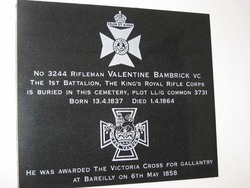
Bambrick's grave in St Pancras Cemetery is unmarked, so a plaque was mounted in the Chapel of the Cemetery in 2002.
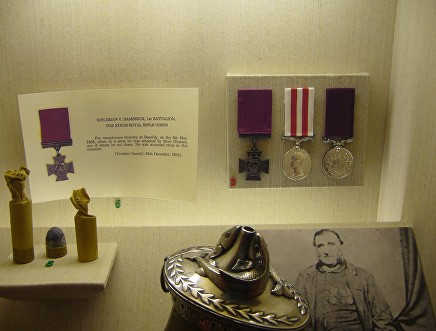
Bambrick's medals are not publicly held. In 2012, replicas of his medals were displayed at the Royal Green Jackets Museum, Winchester. (Picture - Thomas Stewart).
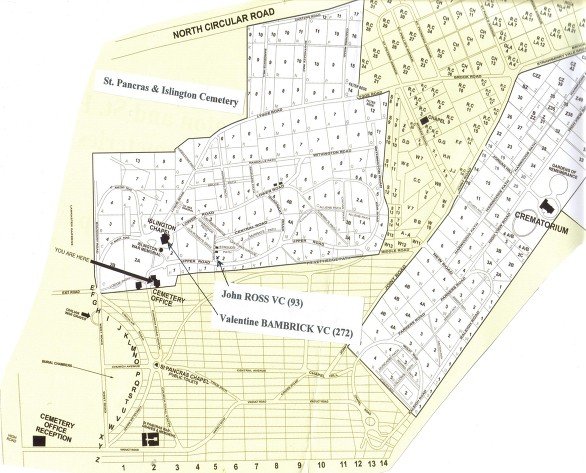
Cemetery Plan courtesy of Kevin Brazier PLOT LL/G, GRAVE 3731 (UNMARKED)
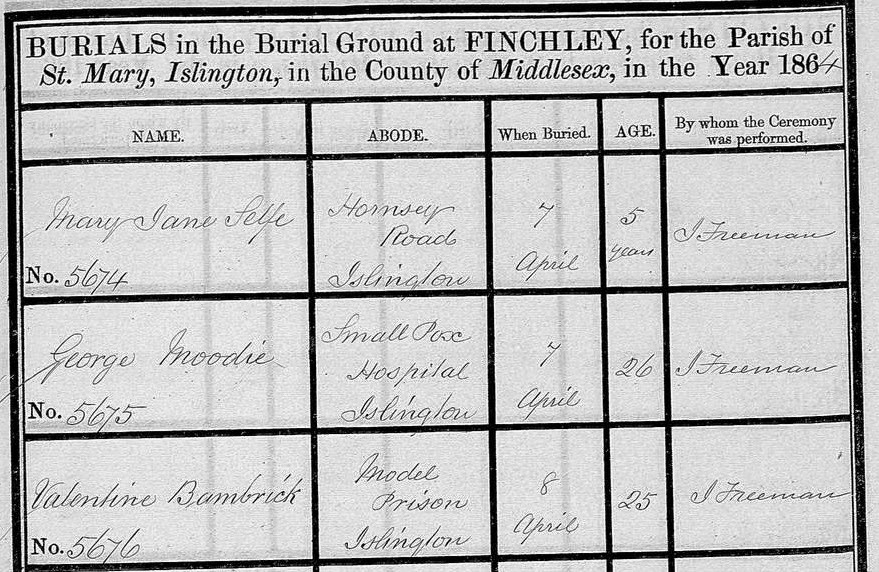
- source of above:Famous Names in St Pancras and Islington Cemetery includes this quote:
Sadly there is no headstone of the grave of another military hero, Victoria Cross awardee, Valentine Bambrick (1837-1864). Bambrick received the VC after being attacked at Bareilly in 1858 during the Indian Mutiny. Three years later, in London, Bambrick was convicted of assault and theft of a comrade's medals. He was thus stripped of his own medal and sent to Pentonville Prison, Whilst there, the stricken Bambrick killed himself. He was then buried in a pauper's grave. Perhaps one of the only momentoes of his death is this record found on the Deceased Online database of 25 year old Bambrick's burial in the cemetery at Finchley on 8 April 1864. A memorial plaque was belatedly erected to him in St Pancras and Islington Cemetery in 2002.
References
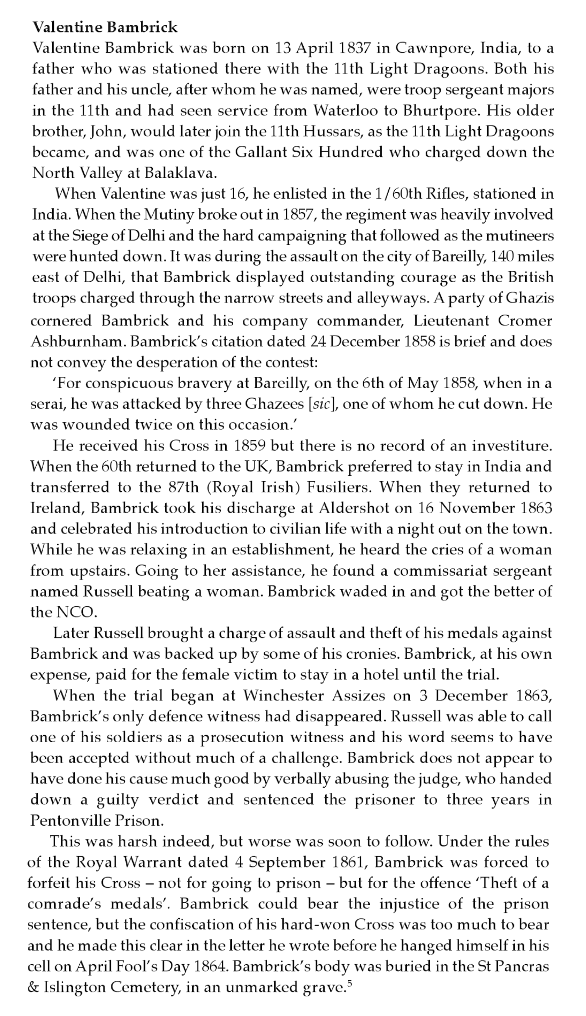
Extract from "The Victoria Crosses that Saved an Empire: The Story of the VCs of the Indian Mutiny"
1864
http://trove.nla.gov.au/newspaper/article/60560433
Empire (Sydney, NSW : 1850 - 1875) Fri 29 Jul 1864 Page 3 MELANCHOLY SUICIDE IN PENTONVILLE PRISON
MELANCHOLY SUICIDE IN PENTONVILLE
PRISON
An inquiry of a melancholy character was instituted by Dr.
Lankester on Tuesday evening at the Pentonville Model
Prison, relative to the death of a prisoner, Valentine
Bambrick aged twenty-eight years, who was found dead
and hanging in his cell on Friday evening last. Last week
a similar inquest was held.
Mr Charles Lawrence Bradley, medical officer of the
prison, said he had been told that he (prisoner) fretted, as
he was being unjustly punished for a crime of which be was
not guilty. His mind was no doubt impaired, and he had
suffered from delirium tremens. A letter was written on
slate by deceased which might be worth the attention of
the jury
On the production of the slate the droner read the fol-
lowing letter : -
" My dear, dear Friends and Family, - Becoming quite
tired of my truly miserable existence, I am about to rush
into the presence of my Maker uncalled unasked. To you I
appeal for forgiveness and pardon for all the unhappiness I
have ever caused you. I dare not ask for mercy of God. I
am doing that which admits of no pardon, but if He will
hear my prayer. I pray to Him to grant you consolation in
your hour of affliction, for I know that, notwithstanding all
my faults, that love which you always manifested towards
me is not withheld yet, and therefore the news of my un
fortunate fate will make time sorrowful. Pray for your
unfortunate son
"VAL BAMBRICK.''
"P.S.-Before I die I protest solemnly my entire
innocence of the charge for which I was punished, all but
the assault, and that was done under the circumstances
before mentioned to you in my letter.
" God bless you all Love to all my relations. Pity even
while you condemn '
" POOR VAL "
John Potter a prisoner, said he was in the next cell to the
deceased. He did not know until that afternoon that he
was dead, when the deputy-governor sent for him and told
him. He only knew deceased by his number, G 21.
Deceased had spoken to him twice. The first time he said,
''I have sent out a special letter, and I expect to be
discharged." The second time he said he was an innocent
man.
The Coroner-Have you any complaint to make of the
diet you have given to you?
Prisonor - No, sir ; I have meat every day
A juror-When the deputy-governor called yon down,
did he instruct you as to what you were to say here?
Prisoner--No, sir.
The foreman, referring to the statement made by the
prisoner they had just examined, wished to know whether
that special letter had been forwarded to the friends.
Captain Craig (the governor, who had been sent for)
informed the jury that on the 26th of February the prisoner
applied to him for permission to write a special letter, and
as he was a well-behaved man he granted the application
Prisoners were only allowed to write a letter on their entry,
and then one every three months. The deceased was not
entitled to write until this month. That special letter was
forwarded to his family directly. A petition followed, and
there was no doubt that, if a certain woman had been found
the deceased would have obtained his release. The deceased
came from Winchester Gaol ; the governor there, feeling
highly interested in the prisoner, endeavoured to get a
commutation of sentence. He considered he was perfectly
innocent, as did also he (Captain Craig). The deceased
was charged with stealing a Victoria Cross and several
medals from a soldier who had created a disturbance in a
brothel at Aldershot with a prostitute. The woman
screamed " Murder," and the deceased (who was also a
soldier) went to protect her. He thrashed the other soldier,
during which his medals fell off Deceased picked them up
and put them on the mantle-shelf. They were, however,
lost and the deceased was accused of the robbery.
Deceased also had a Victoria Cross and medals and
a pension of £10 a-year for life; the latter, was however,
forfeited by the conviction While the deceased was in
that prison an order from the Secretary of State arrived,
directing that the Victoria Cross which had been obtained
by the deceased should be also forfeited, and this also affected
the deceased.
A juror wished to know if a copy of the letter on the date
would he forwarded to the friends
Captain Craig replied that no transcript would be made,
but the original became their property, and would be
forwarded to them with the decision of the coroner's
jury. The body could be buried either by them or otherwise.
After some remarks on the very melancholy character of
the case,
The jury returned a verdict of " Suicide while labouring
under unsound mind."
1863
http://trove.nla.gov.au/newspaper/article/3169054
The Courier (Brisbane, Qld. : 1861 - 1864) Sat 12 Mar 1864 Page 3 FLOGGING IN THE ARMY.
FLOGGING IN THE ARMY.
From the Daily Telegraph, December 8.
(Note this was published in the Courier on 12 Mar 1864, but is from the Daily Telegraph December 8, presumably 1863!!)
On Thursday last a soldier was tried at
Winchester Assizes whose case may serve to
illustrate the kind of men with whom the
army authorities have to deal, and to remind
the public, at the same time, how much
rough and rude nobility is still to be
found in tho ranks. Valentine Bambrick,
a man who had earned the Victoria Cross
by his valor, has just been sentenced to
penal servitude for three years. The
story is short and simple. Drinking one
night at Aldershot, a brawl arose, in which
some of the miserable women who haunt the
purlieus of the camp were concerned. Caro-
lina Johnson—who is described, with a world
of pathetic significance in the formal phrase-
ology, as "spinster, without occupation"—
was in the company of Bambrick. Russell,
a lance corporal in the Commissariat Depart-
ment, came up to the door of the house, in
front of which they were standing, and in
which Russell also was a lodger. If the
story of the latter is to be entirely trusted—
and it was undoubtedly believed both by
judge and jury—Bambrick suddenly rushed
upon him without the slightest provocation,
assaulted him, and tore from his breast four
silver medals. For stealing those he was
placed upon his trial, and his statement that
he attacked Russel simply because the latter
was ill-treating a woman was unsup-
ported by any other testimony than his
own. Ho had served in the army for
ten years; he would have beenn entitled
to his discharge the very day after this occur-
rence. When the verdict of guilty was de-
livered, the judgo, who had been struck by
the soldier's manly bearing and evident in-
telligence, deferred passing sentence until
tho following morning; but as they moved
the prisoner from the dock he cried out, " It's
of no consequence what you do now. I don't
caro about loosing my pension ; but I have
lost my position. I don't care what you do
with mo. You may hang me if you like."
Next day the judge condemned bim to penal
servitude for three years ; and thou, turning
to tho female prisoner, he was about to pass
sentence upon her, when Bambrick, seizing
the girl's hand in his strong grasp, held it
aloft, and cried out, with a wild chivalry
that must have appealed to the human sym-
pathy of every one in that court, "Look
at this small hand, my lord! What
could she have done against a strong man?
She was merely in the room." His last words
before he was led away to gaol wore these,
"There won't be a bigger robber in England
than I shall be when I come out I" It was a
reckless and desperate speech; but such a
man as this is not to be despaired of. For
once, the prison chaplain will, we venture to
assert, meet with a nature that can be won
to better things. This soldier—one of our
proudest "Legion of Honor"—nevor did any-
thing finer or braver then when, faithful to
the Iast to his unhappy companion, he made
that touching appeal on her behalf.
The roughest fellows in the ranks have in
them some elements of good. Humanity,
kindness, consideration for their failings,
would soon develop these to their full extent.
Such men as Bambrick are not uncommon ;
but their virtues are stunted, their vices con-
firmed, by a system which gives them
scarcely any opportunities for self-improve-
ment, whilst it punishes their faults and
error by the lash. The cat-o-nne-tails
never yet made a bad soldier into a good one;
but it has made many a goon one bad.